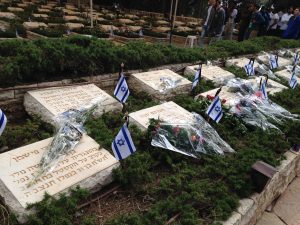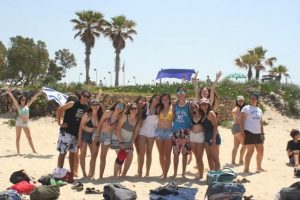Editor’s Note: Over the next couple of days, we prepare to mourn fallen Israeli soldiers and celebrate the existence of the state of Israel. Emtza USYer, Levi Rose, writes about what he experienced when he spent part of his sophomore year on Tichon Ramah Yerushalayim and how he felt transitioning between Yom HaZikaron and Yom Ha’atzmaut.
My second semester of sophomore year, I was in Israel with Tichon Ramah Yerushalayim (TRY). I was also lucky enough to be in Israel for Yom HaZikaron and Yom Ha’atzmaut. Being in Israel for these two fundamental days on the Jewish calendar is a one-of-a-kind experience, and difficult to encompass in words. The raw emotion and passion that is present is incomparable to our understanding of national holidays as North American Jews. Being in Israel – the homeland of our nation for 4,000 years, our home that recently hosted the return of our people – enhances the intense and authentic emotion of these two days.
When I was in Israel for Yom HaZikaron, everyone was dressed in white for a day dedicated to remembrance. We went to programs and ceremonies with different communities in memory of soldiers  who died protecting the Jewish State and the ideals of Zionism and Jewish self-determination. A siren sounded across all of Israel, and people stopped what they were doing and waited. For two whole minutes a country stopped working, driving, and eating to respect the sacrifice of the young men and women who protected the Jewish people. The sound of the siren was clear and steady. The only thing to think about was the brave people and how they were no longer with us; there was comfort in knowing that a nation stood together, standing strong and free to remember those who were not there to stand.
who died protecting the Jewish State and the ideals of Zionism and Jewish self-determination. A siren sounded across all of Israel, and people stopped what they were doing and waited. For two whole minutes a country stopped working, driving, and eating to respect the sacrifice of the young men and women who protected the Jewish people. The sound of the siren was clear and steady. The only thing to think about was the brave people and how they were no longer with us; there was comfort in knowing that a nation stood together, standing strong and free to remember those who were not there to stand.
As the day ended and night fell, there was a shift. Quickly the nation switched from depression to exuberance as they celebrated the independence of Israel. Although we had just spent the day mourning for the loved ones who were lost, we as a nation followed the words of Rebbe Nachman: Mitzvah g’dolah lihiyot b’simcha tamid, it is a great mitzvah to always be happy. People took to the streets, loud music  was playing, silly string and bubbles were everywhere. It didn’t matter who you were or where you were from, everyone was family and everyone was in the free Jewish state together. The next morning we went to the beach, had a picnic, and celebrated. We invited American kids visiting Israel to play games and have a barbeque with us at night. The day was about joy, about being in a Jewish country surrounded by your community. For the day, you forgot about the worries of normal life; you forgot about stress and complicated issues. All you could feel was grateful. The Jewish people had been exiled twice and had been away from our ancestral homeland for two thousand years, and on that specific date, 70 years ago, we had officially returned. Despite three years earlier surviving one of the worst moments in our history, the Holocaust, we created a state where all Jews could be safe and welcomed. This overwhelming sense of joy is one that is difficult to describe in words, and is only something that can truly be felt by going to Israel yourself.
was playing, silly string and bubbles were everywhere. It didn’t matter who you were or where you were from, everyone was family and everyone was in the free Jewish state together. The next morning we went to the beach, had a picnic, and celebrated. We invited American kids visiting Israel to play games and have a barbeque with us at night. The day was about joy, about being in a Jewish country surrounded by your community. For the day, you forgot about the worries of normal life; you forgot about stress and complicated issues. All you could feel was grateful. The Jewish people had been exiled twice and had been away from our ancestral homeland for two thousand years, and on that specific date, 70 years ago, we had officially returned. Despite three years earlier surviving one of the worst moments in our history, the Holocaust, we created a state where all Jews could be safe and welcomed. This overwhelming sense of joy is one that is difficult to describe in words, and is only something that can truly be felt by going to Israel yourself.
My experience in Israel during this time was deeply emotional and personal. I had been living in the State for a few months and had been learning about Jewish history. I had been to the Kotel, Dead Sea and Masada, and I had also traveled to Poland to see the ghettos and death camps. Understanding what led up to the birth of Israel makes you appreciate the blessing it is to have her. These two days are intentionally placed together to show the success and failure that Israel has had in its existence. It is to show that at our lows, there are highs, and at our highs, there are lows. It’s an admission that we know we are not perfect, and an acceptance that we don’t always have to be. We love Israel regardless, and we are proud to be able to call Israel our home.
Levi Rose is a junior from Emtza USY. He is a proud member of B’nai Amoona USY (BAUSY), and currently serves as the Israel Affairs Vice President on Emtza Regional Executive Board.